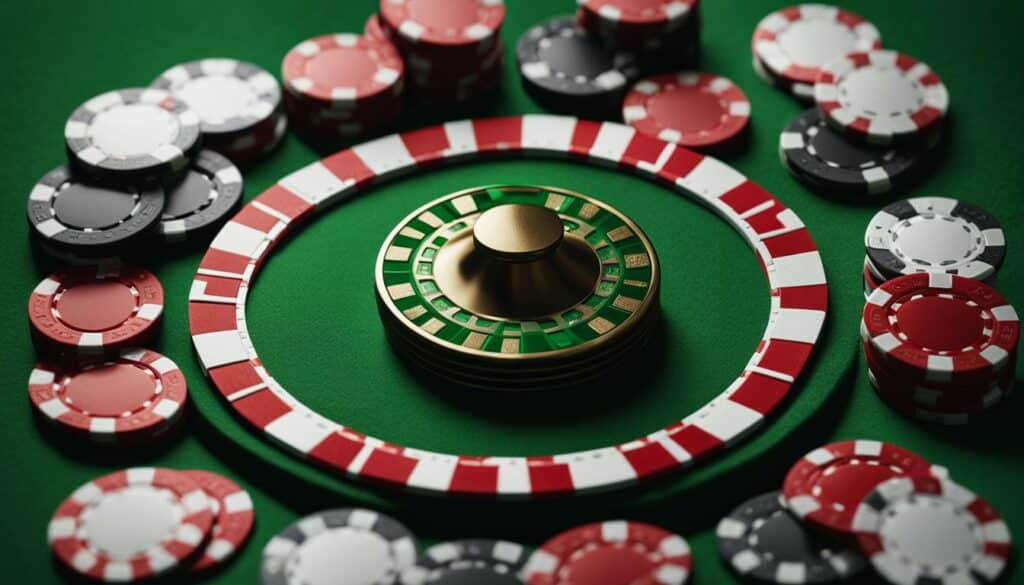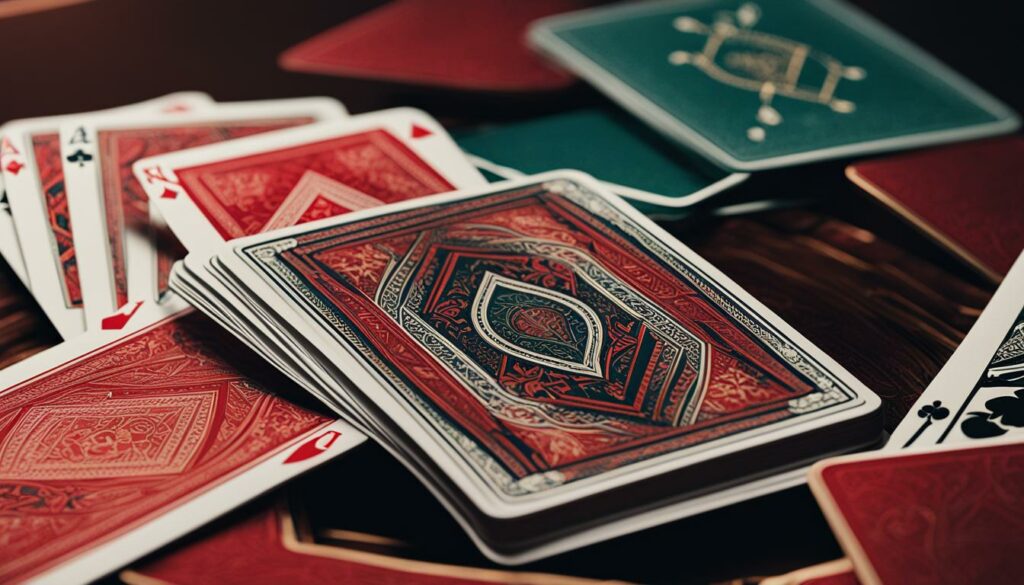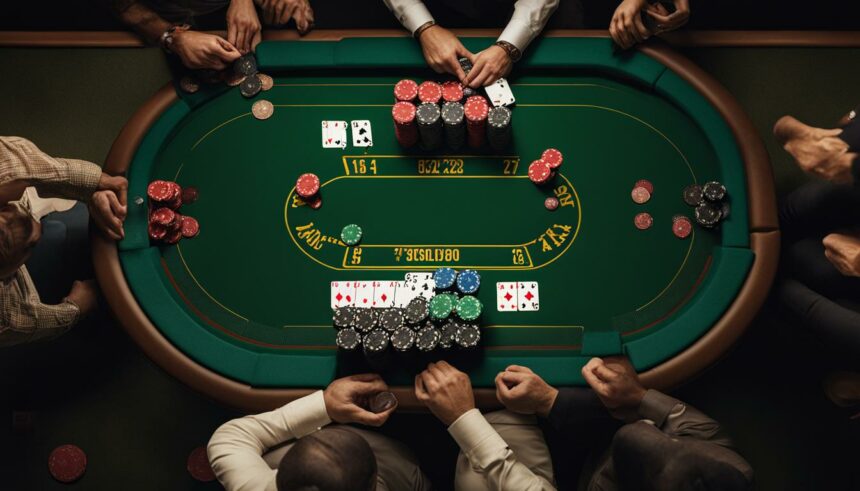When it comes to playing poker, one of the most crucial decisions to make is how many decks to use. The best number of decks for poker can vary based on the type of game you’re playing and your personal preferences. Choosing the optimal deck count for poker is key to enhancing gameplay and having a smoother, more enjoyable experience.
In this article, we will explore the optimal deck count in poker and help you determine the ideal deck size for your game. We’ll discuss the advantages and disadvantages of using different deck sizes and provide recommendations on how many decks to use based on the type of poker variation you’re playing.
Whether you’re a seasoned player or a beginner just starting, understanding how many decks to play poker with is critical to elevate your game. Let’s dive into the details and find out the best deck count for poker.
Determining the Ideal Deck Size for Playing Poker
Choosing the right number of decks for a game of poker can impact the overall experience. To determine the ideal deck size, consider the following factors:
Game Variation
Some poker variations require specific deck sizes. For example, Texas Hold’em requires a standard 52-card deck, while Omaha Hold’em uses a 40-card deck. Determine which game variation you will play before selecting the deck size.
Number of Players
The number of players participating in the game can affect which deck size works best. For smaller games, a single deck may suffice, while larger games may require multiple decks to accommodate more players.
Game Duration
The game’s expected duration can also factor into the deck size. Longer games may require multiple decks to avoid card wear and increase the game’s longevity.
By considering these elements, you can determine the ideal deck size for your poker game. Remember, the right deck count in poker games can lead to a better experience for all players involved.
Advantages of Using Different Deck Sizes in Poker
Playing poker with different deck sizes can have many advantages and disadvantages. The deck count in poker games is an important factor that can influence your gameplay. Here’s a breakdown of the advantages of using different deck sizes:
- Variety: Different deck sizes provide a fresh experience, keeping the game exciting. You can keep switching between deck counts, resulting in more fun and new challenges.
- Complexity: Depending on the deck size, the complexity of the game can change. A bigger deck can make it more challenging to calculate the odds, while a smaller deck can make it easier to keep control.
- Higher Winning Chances: Using two decks instead of one can double your chances of getting certain cards. This can be especially useful in games like Texas Hold’em where complex hands can result in more chances of winning.
- Less Shuffling: A larger deck of cards requires more shuffling so with fewer decks, the game can become faster-paced. This can be a benefit if you’re playing in a tournament where time and hands played can be a deciding factor.
However, there are also some drawbacks to consider:
- Less Strategy: Using more decks means there is less room for strategy in the game. With fewer cards in the mix, players have to work harder to outsmart their opponents. A larger deck diminishes the importance of strategy and increases the role that luck has on the game.
- Less Intensity: Playing poker with more decks spreads out the tension and anticipation of the game. This can limit the adrenaline rush of the game, resulting in less excitement.
Choosing the deck count can influence your gaming experience in multiple ways, and it always has its pros and cons. Remember that it’s important to select the right number of decks for the type of game you’re playing.
Effective Deck Count for Poker Tournaments
In poker tournaments, the number of decks used can have a significant impact on the overall gameplay. To ensure a fair and enjoyable experience for all players, there are specific poker deck quantity recommendations that organizers follow. Selecting the correct number of decks for poker tournaments can make a big difference, so it’s crucial to understand what deck count will work best for your game.
Generally, most tournaments will use either one or two decks of cards. However, larger tournaments with thousands of players may use more decks to speed up the game and prevent delays. It’s essential to choose a deck count that will promote equal chances of winning, add to the excitement, and keep the game moving along at a good pace.

The most effective deck count for a poker tournament can depend on various factors such as the number of players, the game type, and the desired duration of the event. For example, Texas Hold’em games typically favor two decks, while Six-Card Omaha games may work better with one deck.
It’s also important to consider how many decks will provide enough cards for players to create winning hands, but not too many that unwanted delays or errors can occur. Overall, it’s best to follow the recommendations of the tournament organizers to ensure a smooth and enjoyable experience for everyone involved.
How Many Decks to Play Poker: Recommendations
Choosing the right number of decks for your poker game is crucial. Different poker variations come with specific recommendations on the number of decks for optimal gameplay. Below is a guide on how many decks to play poker based on the game type and your gaming style.
Standard Poker Games
For standard poker games like Texas Hold’em and Omaha, one deck of 52 cards is recommended. One deck provides a perfect balance between chance and skill, making it ideal for these games.
Multi-Table Tournaments
Multi-table poker tournaments have higher stakes and are often played over several hours. A single deck may not provide enough cards to accommodate all the players. Therefore, using two decks is recommended to minimize the risk of running out of cards.
Cash Games
Cash games involve a wide range of players, and adapting to their unique playing styles can be a challenge. Two decks are recommended, as they provide a more substantial number of cards, which guarantees that the game will not be interrupted, as players run out of cards.

Pro Tip: Always choose the number of decks based on the game variation and the number of players, giving you the best chance of having a smooth poker experience.
Conclusion
In conclusion, determining the ideal number of decks to use when playing poker is a crucial aspect of the game. By considering various factors, such as personal preferences and the type of game being played, players can find the optimal deck count that enhances their gameplay experience.
While there are no hard and fast rules when it comes to deck size, players should experiment with different deck counts to find what works best for them. Whether it’s playing with a single deck or multiple decks, the key is to find the right balance that provides a smooth and enjoyable experience.
Remember, the number of decks used in poker tournaments may be different from those used in casual games. It’s always a good idea to check the recommended deck count for the specific tournament or game being played to ensure optimal gameplay.
In the end, selecting the correct number of decks for poker can have a significant impact on the game. Take the time to experiment and discover the optimal deck count that works best for your playing style and preferences.
FAQ
How many decks should I use when playing poker?
The number of decks to use in poker depends on various factors such as the game type, the number of players, and personal preference. In general, most poker games are played with a standard deck of 52 cards. However, some variations may require additional decks or a reduced number of cards. It is essential to consider these factors when determining the optimal deck count for your game.
How do I choose the right number of decks for poker?
To choose the right number of decks for poker, consider the game type and the number of players. For smaller games with fewer players, a single deck is generally sufficient. If you are playing a larger game or a poker variant that requires more cards, you may need to use multiple decks. Additionally, some players prefer using more decks to increase randomness and reduce card counting possibilities. Ultimately, selecting the correct number of decks depends on your preferences and the specific game you are playing.
What are the advantages of using different deck sizes in poker?
Using different deck sizes in poker can introduce several advantages. Playing with a single deck can simplify the game and make it easier to keep track of the cards. On the other hand, using multiple decks can increase the complexity and add more unpredictability to the gameplay. Additionally, using more decks can reduce the chances of card counting and increase the randomness of the outcomes. However, it is important to note that using more decks may also require adjustments to your strategies and tactics.
What is the effective deck count for poker tournaments?
The effective deck count for poker tournaments can vary depending on the tournament structure, the number of players, and the desired gameplay speed. In general, most tournament organizers recommend using 2 to 4 decks to ensure a smooth and efficient gameplay experience. Using a higher number of decks helps maintain a consistent flow of cards and reduces the downtime between hands. However, it is essential to consider the specific tournament rules and regulations to determine the most suitable deck count for your poker tournament.
How many decks should I play poker with? Any recommendations?
The ideal number of decks to play poker with depends on the game variant and your personal preferences. Here are some recommendations based on popular poker variations:
– Texas Hold’em: It is typically played with one standard deck of 52 cards.
– Omaha: Similar to Texas Hold’em, it is also commonly played with one deck.
– Five-Card Draw: One deck of cards is usually sufficient.
– Seven-Card Stud: This game variant is often played with one or two decks, depending on the number of players and house rules.
It is important to note that these recommendations are not definitive, and some players may have their own preferences. Experiment with different deck sizes and find the one that suits your playing style and enjoyment level.




